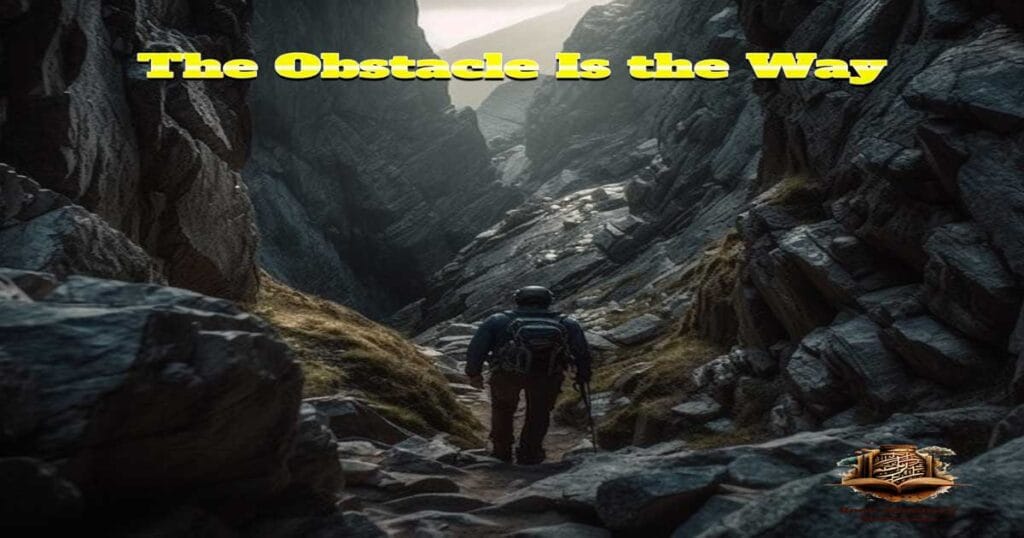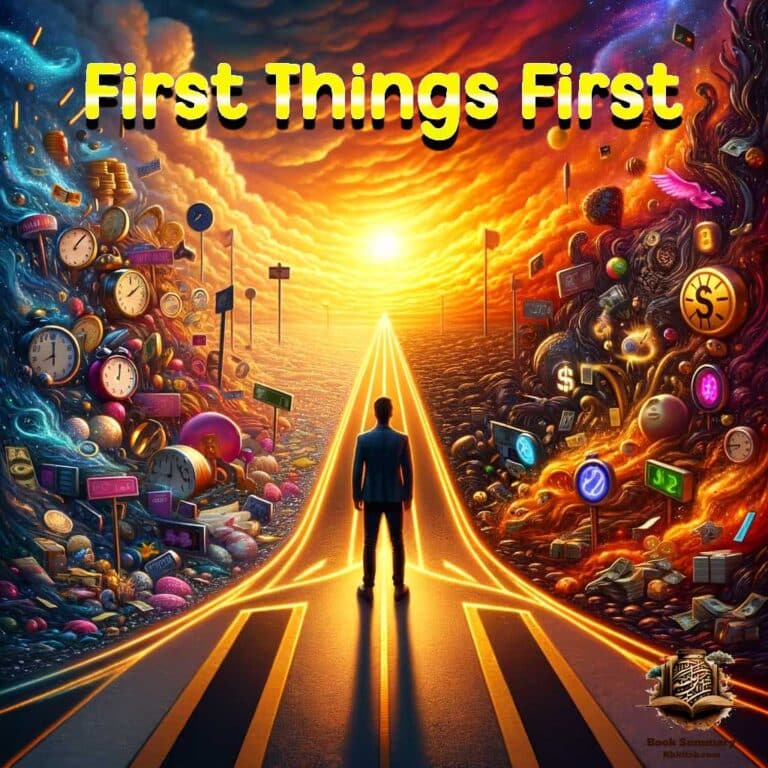
“Have you ever wondered how to transform trials into triumphs? How to turn obstacles into opportunities? In ‘The Obstacle Is The Way: The Timeless Art of Turning Trials into Triumph,’ author Ryan Holiday offers us a riveting exploration of these questions and more.
The book is a comprehensive guide to overcoming adversity, inspired by the wisdom of ancient Stoic philosophers like Marcus Aurelius. Ryan Holiday asserts that the secret to success lies not in avoiding obstacles but in embracing them, using them as stepping stones to achieve greater heights. Through a mixture of philosophical insight and powerful anecdotes, the book provides practical strategies for maintaining mental, spiritual, and ethical stability in the face of challenges.
Whether you’re facing personal struggles or looking for a roadmap to professional success, ‘The Obstacle Is The Way’ offers an essential toolkit for resilience, adaptability, and personal growth. It invites us all on a journey to discover how the trials we often dread can, in fact, become our greatest opportunities.”
جدول المحتويات
Persistence in Pursuit: Unpacking the Power of Tireless Work in ‘The Obstacle Is the Way’
In today’s world where quick fixes and shortcuts often reign supreme, Ryan Holiday’s bestseller “The Obstacle Is the Way: The Timeless Art of Turning Trials into Triumph,” serves as a poignant reminder of the timeless power of hard work, consistency, and patience. He argues that success isn’t an overnight phenomenon but the fruit of relentless pursuit and indefatigable efforts.
Holiday underscores that the journey to success is not a sprint but a marathon, that requires continuous dedication. He discourages against looking for the path of least resistance or waiting for perfect conditions. Instead, he champions the concept of ‘action’—of moving forward even when the going gets tough, even when progress is slow.
The book resounds with the age-old wisdom: ‘Rome wasn’t built in a day.’ This maxim is the core of Holiday’s philosophy. Success, he suggests, is built brick by brick, through a gradual accumulation of efforts. Every task we accomplish, no matter how small or mundane it may seem, contributes to the bigger picture.
Holiday also advocates for the virtue of patience in this process. He argues that impatience often leads to rash decisions and can make one lose sight of the bigger picture. Instead, embracing patience allows for more calculated decisions and promotes long-term thinking, which is critical for lasting success.
Additionally, he points out that consistent work also brings another significant advantage – it fosters resilience. By working tirelessly towards our goals, we build mental and emotional stamina that helps us to keep going during tough times. This resilience is an invaluable asset when facing the inevitable obstacles and setbacks that come our way.
Furthermore, Holiday emphasizes that tireless work is not about working mindlessly or to the point of burnout. Instead, it’s about developing a sustainable work ethic, one that balances effort and rest, and values the quality of work as much as the quantity.
In conclusion, “The Obstacle Is the Way” sheds light on the often overlooked virtues of hard, continuous work, and patience. It serves as a reminder that there are no shortcuts to any place worth going, and that tireless effort and unwavering persistence often make the difference between success and failure.
How Does ‘The Obstacle Is The Way’ Illuminate the Principles of Stoic Philosophy in Overcoming Challenges?
In the fast-paced, ever-changing world we live in today, there’s a powerful ancient philosophy that’s being increasingly sought after for guidance and resilience. Stoicism, with its focus on virtue, tolerance, and self-control, has remained pertinent over centuries, and its principles are at the heart of Ryan Holiday’s book, “The Obstacle Is The Way: The Timeless Art of Turning Trials into Triumph”.
In his book, Holiday explores the foundation of Stoicism, tracing it back to its roots in ancient Greece and Rome, focusing particularly on the teachings of the Stoic philosopher, Marcus Aurelius. Holiday emphasizes the Stoic belief in maintaining mental, spiritual, and ethical stability, regardless of external circumstances. He asserts that by mastering our own emotions and reactions, we can face life’s obstacles with calm and rationality, transforming them into opportunities for growth and learning.
Holiday explores Stoic values such as patience, endurance, and acceptance, portraying them as vital tools in the face of adversity. He argues that it’s not the obstacles themselves that cause us distress, but rather, our reactions to them. By adopting a Stoic approach, we can view these challenges not as hindrances but as essential elements in our journey towards personal development.
Moreover, Holiday presents the concept of Amor Fati, or “love of fate,” a Stoic principle that suggests we should embrace and accept whatever happens in life, good or bad, instead of complaining about or resisting what we can’t control. This level of acceptance, according to Holiday, allows us to focus our energy on what we can influence, leading to a more effective and satisfying life.
Another prominent Stoic principle discussed in the book is the dichotomy of control, which divides all matters into two categories: things we can control, and things we can’t. Stoics focus their time and energy only on what they can control — their beliefs, judgments, and actions. This principle is particularly potent when dealing with obstacles and challenges; instead of wasting energy on worrying about uncontrollable elements, we can focus on our attitude and reaction, thus turning any obstacle into a way forward.
Through the exploration of these principles and the use of poignant real-life stories, “The Obstacle Is The Way” presents a compelling case for the power and relevance of Stoic philosophy in our modern lives. As the title suggests, every obstacle, when faced with patience, wisdom, and equanimity, can indeed become the way to personal growth and triumph.
Can Obstacles Actually Be Our Path to Success? An Exploration through ‘The Obstacle Is the Way’
In our personal and professional lives, we often come across obstacles that seem to thwart our progress. These obstacles can create a sense of anxiety and frustration, leading us to believe that they are impediments to our success. But what if these obstacles are actually the stepping stones towards our improvement and growth? This is the intriguing question that Ryan Holiday explores in his book, “The Obstacle Is the Way: The Timeless Art of Turning Trials into Triumph”.
Drawing on the ancient wisdom of Stoic philosophy, Holiday redefines obstacles not as hindrances, but as opportunities for self-improvement and personal growth. He encourages us to shift our perspective and see obstacles as challenges that test our resilience and adaptability.
In his transformative book, Holiday presents numerous historical and contemporary figures who turned trials into triumphs. From prominent historical figures like Amelia Earhart and Thomas Edison to modern entrepreneurs and athletes, he outlines how they harnessed the power of their obstacles, using them as a catalyst for their extraordinary achievements.
Through engaging narratives and thought-provoking insights, Holiday guides us in turning our perceived limitations into strengths. He emphasizes that the path to success is not to avoid or eliminate obstacles but to approach them with a new perspective. He encourages us to perceive obstacles as necessary elements of our journey, urging us to transform adversity into advantage, to embrace challenges as chances for innovation, and to see setbacks as setups for comebacks.
In conclusion, “The Obstacle Is the Way” provides us with a powerful paradigm shift. It prompts us to redefine our relationship with obstacles, transforming them from sources of frustration and anxiety into opportunities for improvement and growth. In doing so, it allows us to unlock our potential and chart our path towards personal and professional success. The book invites us to ask ourselves a fundamental question: What if our obstacles are actually the way forward?
Self-development – Book Summary (khkitab.com)
How Have Ordinary People Transformed Obstacles into Triumphs? A Deep Dive into ‘The Obstacle Is the Way’
One of the most potent aspects of human nature is our ability to overcome adversity. Throughout history, people from various walks of life have encountered substantial obstacles, only to turn them into remarkable triumphs. These transformative narratives form the crux of Ryan Holiday’s book, “The Obstacle Is the Way: The Timeless Art of Turning Trials into Triumph”.
In this compelling work, Holiday brings together a rich tapestry of stories, ranging from historical figures to modern leaders, each providing a unique insight into how they transformed their personal obstacles into opportunities. Each narrative serves as a testament to human resilience and the power of a positive mindset.
The book narrates the journey of figures like Thomas Edison, whose numerous failed experiments didn’t deter him, but instead spurred him on to create innovations that revolutionized the world. Similarly, we hear about Theodore Roosevelt, who, despite suffering from severe asthma as a child, transformed himself into a robust outdoorsman and eventually became the President of the United States.
In the realm of modern leaders, Holiday spotlights the entrepreneurial journey of Steve Jobs, who faced numerous setbacks, yet remained undeterred and built one of the most successful tech companies in history. He also explores the inspiring story of Aron Ralston, who, faced with a life-threatening situation, demonstrated extreme resilience to survive.
Through these narratives, Holiday prompts readers to reassess their perception of obstacles. Rather than viewing them as roadblocks, he urges us to see them as tests of our resilience, determination, and creativity. By sharing these powerful stories, Holiday illustrates the potential within all of us to convert challenges into chances and trials into triumphs.
To conclude, “The Obstacle Is the Way” provides readers with an illuminating exploration into the lives of individuals who transformed obstacles into opportunities. By doing so, it instills a renewed sense of resilience, courage, and perseverance, reinforcing the belief that obstacles are not the end but, indeed, the way forward.
Mastering The Art of Overcoming Obstacles: Key Takeaways from ‘The Obstacle Is the Way’
Ryan Holiday, in his acclaimed book “The Obstacle Is the Way: The Timeless Art of Turning Trials into Triumph,” not only reshapes our perspective towards obstacles but also provides a practical guide on how to navigate these challenges. His strategies present a blueprint that empowers readers to transform adversity into advantage.
A central theme of the book is the emphasis on action. Holiday argues that taking decisive steps, regardless of how small, can create a momentum that propels us towards overcoming our obstacles. It is through relentless pursuit and iterative progress that we forge a path through seemingly insurmountable challenges.
Another key strategy Holiday proposes is reframing our perception of obstacles. He encourages us to view obstacles not as hindrances but as unique opportunities for learning, growth, and innovation. This shift in perspective, according to Holiday, is a significant step towards turning trials into triumphs.
Holiday also emphasizes the importance of resilience and endurance. He suggests that developing a stoic mindset, one that embraces challenges and remains steady in the face of adversity, can serve as a powerful tool for overcoming obstacles. Drawing on historical examples, he elucidates how stoicism has guided successful individuals through hardships towards achievement.
In addition, Holiday explores the concept of ‘Amor Fati,’ a Latin term meaning ‘love of fate.’ By accepting and embracing our circumstances, including our obstacles, we can leverage them for our benefit. Rather than expending energy resisting our situation, ‘Amor Fati’ teaches us to adapt and extract value from our difficulties.
Lastly, Holiday recommends an approach of continual learning. Each obstacle, he argues, provides a lesson to learn and an opportunity to improve. By maintaining a learning mindset, we continually grow, evolve, and equip ourselves to better handle future obstacles.
In essence, “The Obstacle Is the Way” offers valuable and actionable strategies for transforming the way we perceive and handle obstacles. By employing these techniques, we can turn our challenges into catalysts for growth and success, thus embodying the timeless art of turning trials into triumph.
Unlocking Inner Strength: A Deep Dive into ‘The Obstacle Is the Way’
One of the central themes in Ryan Holiday’s groundbreaking work, “The Obstacle Is the Way: The Timeless Art of Turning Trials into Triumph,” is the cultivation and reliance upon inner strength. Holiday doesn’t merely discuss this concept; he paints a vivid picture of it, providing examples and suggesting practical exercises to foster this strength, which he suggests is inherent in all of us.
The book asserts that the power to overcome adversity lies within us. No matter how formidable the challenges we face, Holiday insists that we have the necessary tools at our disposal. What’s required is an awareness of our innate capacity to deal with adversities and the cultivation of our inner fortitude.
Holiday introduces the Stoic concept of inner citadel, an unassailable stronghold within us that can withstand any external pressure or situation. This notion of inner strength aligns with the Stoic idea that while we can’t control external events, we can control our internal reactions.
Self-confidence is another vital aspect of inner strength that Holiday explores. The book suggests that the first step in overcoming obstacles is believing that you can. It’s not about ignoring the size or complexity of the challenge but about trusting in your abilities to navigate through it.
A critical aspect of self-confidence is self-reliance, not to be mistaken with isolating oneself or refusing help from others. Instead, Holiday means that we should have the conviction that we can weather any storm, regardless of its severity, and the resilience to get back on our feet when we’re knocked down.
Holiday also emphasizes that this inner strength needs to be nurtured and grown. It is not a static characteristic but a dynamic trait that can be developed and amplified. Holiday suggests practices such as regular introspection, reading, and learning from successful people who’ve overcome adversities can all contribute to strengthening our inner citadel.
In conclusion, “The Obstacle Is the Way” offers us an insightful guide into discovering, understanding, and augmenting our inner strength. By harnessing this strength, we not only equip ourselves to overcome obstacles but also to transform them into stepping stones on the path to triumph.
Turning Failure into Fuel: Lessons from ‘The Obstacle Is the Way’
Many fear failure, seeing it as a symbol of defeat or inadequacy. However, in his transformative work, “The Obstacle Is the Way: The Timeless Art of Turning Trials into Triumph,” Ryan Holiday reframes this perception of failure and portrays it as a potent tool for learning and growth.
Holiday urges readers to challenge traditional views on failure and to see it not as an end but as a stepping-stone towards success. The crux of his argument lies in the understanding that failure is a natural part of life. It’s an inevitability, and rather than shy away from it, we should embrace it, learn from it, and use it to drive our future success.
Holiday’s Stoic-inspired perspective posits that there’s wisdom in failure if we’re willing to seek it. Every failure is a lesson in disguise. It reveals our shortcomings, provides insight into what doesn’t work, and pushes us to explore new approaches. However, gaining these insights requires a mindset shift—a willingness to analyze our failures critically, to learn from them, and to adjust our strategies accordingly.
Moreover, Holiday suggests that failure teaches resilience. When we fail and pick ourselves up, we build resilience and toughness. We learn that failure isn’t fatal, and we become less afraid of taking risks, leading us to pursue more significant and more rewarding opportunities.
Holiday also offers practical advice on dealing with failure. He recommends separating what we can control from what we can’t. Often, failure results from circumstances beyond our control, and recognizing this can alleviate a lot of unnecessary frustration and self-blame.
Additionally, Holiday advises using failure as a guide for personal development. By analyzing our failures, we can identify areas that need improvement. Failure, in this sense, can be an effective tool for self-improvement and personal growth.
In conclusion, “The Obstacle Is the Way” reframes failure as a natural, integral part of life, and an important teacher. By accepting and learning from our failures, we can leverage them to fuel our growth and propel us towards triumph.
Cultivating Equanimity: The Art of Balanced Perception in ‘The Obstacle Is the Way’
In “The Obstacle Is the Way: The Timeless Art of Turning Trials into Triumph,” Ryan Holiday invites readers to delve deep into the power of perception and awareness. The ability to maintain balance, calmness, and rationality amidst obstacles, he argues, is a cornerstone of personal growth and success.
Holiday introduces his readers to the Stoic philosophy’s core tenet – that we cannot control what happens to us, but we can control how we respond. This is where perception and awareness come into play. It is through our perception of events that we grant them meaning, and it is through our awareness that we recognize our power to choose our responses.
Balancing our emotional responses, maintaining a calm demeanor in the face of adversity, and approaching problems with rational thinking are key themes of the book. Holiday advocates for a shift from a reactive to a proactive mindset, encouraging readers to master their emotions and reactions. Such mastery allows us to turn challenges into learning opportunities and fuel for growth, rather than sources of anxiety or despair.
Perception and awareness also go hand in hand with mindfulness – the practice of being fully present and engaged in the current moment. Mindfulness allows us to be more attuned to our emotions and reactions, thereby fostering rational decision-making. It is only by acknowledging our emotions can we learn to manage them effectively.
Holiday further illuminates the idea of perception through real-life stories of individuals who harnessed their power to perceive obstacles as stepping stones towards their goals. These narratives serve as tangible reminders that our perception, more than the reality of our circumstances, determines our ability to overcome challenges.
In addition to mindfulness, Holiday encourages developing mental resilience and agility. The ability to stay mentally flexible allows us to adapt our perspectives, strategize effectively, and remain steadfast on our path, no matter the obstacles we face.
In conclusion, “The Obstacle Is the Way” provides a powerful exploration of perception and awareness as crucial skills for navigating life’s challenges. It asserts that maintaining balance, calmness, and rationality is not just a response to obstacles, but a strategy for turning trials into triumphs. The book challenges readers to cultivate these skills, ultimately serving as a manual for personal growth and empowerment.
Mastering Adaptability: Navigating Change with ‘The Obstacle Is the Way’
Ryan Holiday’s book, “The Obstacle Is the Way: The Timeless Art of Turning Trials into Triumph”, serves as a handbook for resilience and adaptability in the face of changing circumstances. The emphasis placed on adaptability highlights its role as a crucial skill for thriving in the evolving landscapes of personal and professional life.
The book begins by challenging the notion that change and uncertainty are to be feared. Instead, Holiday encourages his readers to embrace change as an integral part of life and growth. He emphasizes that adaptability is not just about survival, but about thriving and capitalizing on the opportunities that change often brings.
Holiday delves into the concept of adaptability by drawing on various historical and contemporary examples of individuals and organizations that have demonstrated exceptional adaptability. These examples serve to illustrate that the ability to adapt effectively is a key differentiator between those who simply survive and those who triumph in the face of adversity.
The author also offers practical strategies and techniques to enhance adaptability. He emphasizes the importance of being open to new ideas and approaches, developing a growth mindset, and maintaining a positive attitude towards change. Holiday encourages readers to remain flexible in their thinking, embrace learning opportunities, and to view setbacks and failures as feedback, not as final outcomes.
Additionally, Holiday explores how the Stoic philosophy’s teachings can be applied to cultivate adaptability. Stoicism’s emphasis on understanding the difference between what we can control and what we can’t plays a crucial role in fostering resilience and adaptability. By focusing on our reactions and responses, rather than external circumstances, we can navigate changes more effectively.
In conclusion, “The Obstacle Is the Way” invites readers on a journey to develop and strengthen their adaptability muscles. It offers actionable insights on how to navigate change, turn trials into triumphs, and leverage adaptability as a tool for personal and professional success. The timeless wisdom contained in its pages serves as a valuable guide for anyone seeking to thrive in an ever-changing world.
Fueling Ambition: The Inspirational Power of ‘The Obstacle Is the Way’
The drive to overcome life’s obstacles can often be an uphill battle. This daunting journey calls for an essential blend of inspiration and motivation. Ryan Holiday’s groundbreaking book, “The Obstacle Is the Way: The Timeless Art of Turning Trials into Triumph”, serves as a torchlight in this endeavor, stimulating its readers to confront their challenges head-on with confidence and courage.
Holiday kicks off the narrative by asserting that obstacles aren’t inherently negative. Instead, he frames them as catalysts that can trigger personal growth and professional progress, fundamentally redefining the reader’s perspective on challenges. It is this innovative perspective that forms the first step towards a more empowered and proactive outlook.
To reinforce this concept, Holiday shares various accounts of historical figures who faced immense challenges and still rose to prominence. These narratives range from successful entrepreneurs who turned bankruptcies into billion-dollar companies to social activists who transformed personal tragedies into global movements. Each story carries the common thread of adversity metamorphosing into triumph, fueling the reader with inspiration and motivation.
Alongside these captivating stories, Holiday presents actionable steps to harness this inspiration into a driving force. He advises readers to focus on their response to obstacles rather than the obstacle itself, implying that the power to overcome and convert adversity into opportunity lies within each individual.
Furthermore, the book explores the Stoic principle of ‘Amor Fati’, or ‘love of fate’. This principle teaches acceptance of everything that happens in life, including adversity, and leveraging it as a stepping stone to build a stronger, resilient self. Holiday insists that accepting and understanding our circumstances gives us the inspiration to take control and build a path towards our goals.
In essence, “The Obstacle Is the Way” serves as a guiding star to anyone seeking the motivation to face life’s adversities. It doesn’t just inspire readers with tales of triumph but also equips them with practical strategies and a philosophy to embrace challenges. By encouraging readers to see obstacles as opportunities for growth, Holiday instills the courage and confidence necessary to conquer even the most formidable of life’s hurdles.


